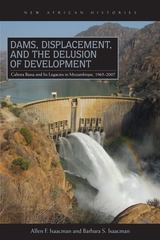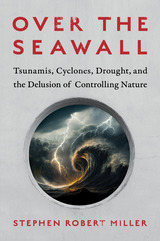

Cahora Bassa Dam on the Zambezi River, built in the early 1970s during the final years of Portuguese rule, was the last major infrastructure project constructed in Africa during the turbulent era of decolonization. Engineers and hydrologists praised the dam for its technical complexity and the skills required to construct what was then the world’s fifth-largest mega-dam. Portuguese colonial officials cited benefits they expected from the dam—from expansion of irrigated farming and European settlement, to improved transportation throughout the Zambezi River Valley, to reduced flooding in this area of unpredictable rainfall. “The project, however, actually resulted in cascading layers of human displacement, violence, and environmental destruction. Its electricity benefited few Mozambicans, even after the former guerrillas of FRELIMO (Frente de Libertação de Moçambique) came to power; instead, it fed industrialization in apartheid South Africa.” (Richard Roberts)
This in-depth study of the region examines the dominant developmentalist narrative that has surrounded the dam, chronicles the continual violence that has accompanied its existence, and gives voice to previously unheard narratives of forced labor, displacement, and historical and contemporary life in the dam’s shadow.

Never have so many undertaken such a widespread, hurried attempt to remake the world. Predictably, our hubris has led to unintended—and sometimes disastrous—consequences. Academics call it maladaptation; in simple terms, it’s about solutions that backfire. Over the Seawall tells us the stories behind these unintended consequences and about the fixes that can do more harm than good. From seawalls in coastal Japan, to the reengineered waters in the Ganges River Delta, to the artificial ribbon of water supporting both farms and urban centers in parched Arizona, Stephen Robert Miller traces the histories of engineering marvels that were once deemed too smart and too big to fail. In each he takes us into the land and culture, seeking out locals and experts to better understand how complicated, grandiose schemes led instead to failure, and to find answers to the technologic holes we’ve dug ourselves into.
Over the Seawall urges us to take a hard look at the fortifications we build and how they’ve fared in the past. It embraces humanity’s penchant for problem-solving, but argues that if we are to adapt successfully to climate change, we must recognize that working with nature is not surrender but the only way to assure a secure future.
READERS
Browse our collection.
PUBLISHERS
See BiblioVault's publisher services.
STUDENT SERVICES
Files for college accessibility offices.
UChicago Accessibility Resources
home | accessibility | search | about | contact us
BiblioVault ® 2001 - 2024
The University of Chicago Press









